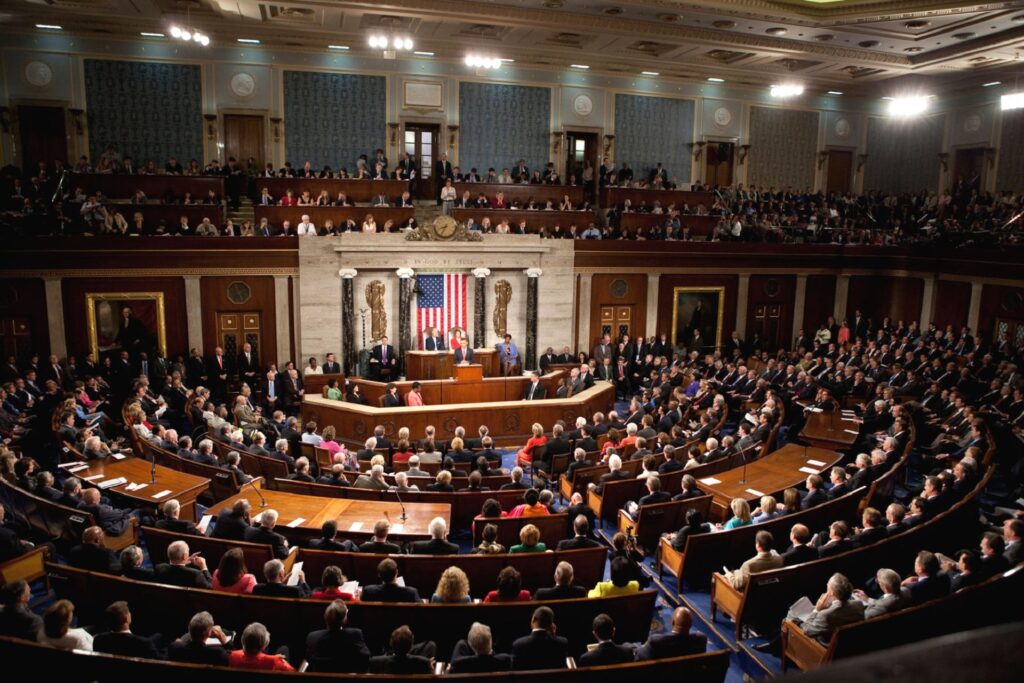A group of bipartisan United States Senators has introduced legislation in the Senate with the aim of countering the role of cryptocurrencies in financing terrorism, specifically referencing the October 7th attack by Hamas on Israel.
Senators Mitt Romney, Mark Warner, Mike Rounds, and Jack Reed announced the introduction of the Terrorism Financing Prevention Act on December 7th.
This proposed bill seeks to expand U.S. sanctions to include individuals or entities that provide funding to terrorist organizations using either cryptocurrency or traditional fiat currencies.
Senator Romney emphasized that this legislation would empower the U.S. Treasury Department to address “emerging threats involving digital assets” in the aftermath of the October 7th attack and activities associated with the terrorist group Hezbollah.
Senator Rounds stressed the importance of equipping the Department of the Treasury with the necessary tools to combat modern terrorism threats.
He explained that the Terrorism Financing Prevention Act takes practical steps towards combating terrorism by imposing sanctions on foreign financial institutions and foreign digital asset companies that assist these groups in carrying out their acts of violence.
Hamas’ attack on Israel has accelerated the need for the United States to address the role of cryptocurrencies in financing terrorism.
READ MORE: Co-founder of Terraform Labs Appeals Extradition Decision in Montenegro
The bipartisan bill aims to broaden the scope of sanctions to cover all terrorist organizations, including Hamas, while also addressing threats linked to digital assets.
The 10-page bill includes provisions enabling the U.S. Treasury to prohibit transactions with a “foreign digital asset transaction facilitator” that is listed as a sanctioned entity.
Notably, the Treasury’s Office of Foreign Assets Control had already sanctioned a crypto operator based in Gaza on October 18th and had added North Korean nationals to its sanctions list for using cryptocurrency mixers to launder funds.
This proposed legislation from the Senators aligns with the concerns voiced by many U.S. lawmakers regarding the alleged role of cryptocurrencies in financing terrorist groups.
In October, around a week after the Hamas attack on Israel, Senator Elizabeth Warren and over 100 lawmakers signed a letter calling for action to effectively curb illicit crypto activity used for funding terrorist organizations.
Senator Warren claimed in a hearing on December 6th that North Korea had funded approximately half of its missile program using proceeds from crypto-related criminal activities.
However, it’s worth noting that blockchain analytics firm Elliptic reported in October that there was “no evidence” indicating that Hamas had received a substantial volume of cryptocurrency donations to finance its attacks.
Krist Novoselic, the co-founder and bassist of the iconic rock band Nirvana, recently took center stage in a shareholder proposal presentation aimed at encouraging Microsoft to reassess its approach to generative artificial intelligence (AI).
This initiative, known as Shareholder Proposal 13: Report on AI Misinformation and Disinformation, was submitted by Arjuna Capital on behalf of Krist Novoselic and various other shareholder groups.
The proposal, as stated in a press release, revolves around Novoselic’s concerns that Microsoft has not thoroughly examined the business and societal implications of generative AI amidst its rapid adoption of this technology.
One of the pivotal concerns highlighted in the proposal is the potential for Microsoft-developed or -endorsed AI models to inadvertently contribute to the proliferation of disinformation and misinformation.
This is a pressing issue, considering the profound impact such false information can have on society.
The proposal also raises questions about the applicability of Section 230, a law that provides internet hosts and users with limited protections against liability for content generated by third parties.
The proposal questions whether these protections would extend to content produced by Microsoft’s own generative AI systems.
READ MORE: JPMorgan CEO Jamie Dimon Faces Backlash from Crypto Community Over Bitcoin Crime Claims
During his presentation, Novoselic posed a thought-provoking question: “What happens when society increasingly relies on information generated by Microsoft’s AI-powered Bing, a platform found to provide inaccurate answers ten percent of the time?”
He also pointed out that earlier in the year, experts had called for a six-month pause on AI development, a plea that Microsoft, along with the rest of the industry, chose to disregard.
According to Novoselic, Microsoft’s haste to bring AI to market seemed to prioritize short-term profits over long-term success, raising concerns about the potential consequences of such a strategy.
Microsoft’s board responded to the proposal by asserting that they had already addressed its request through existing and forthcoming reporting.
However, Arjuna Capital argued that the proposal aimed to elicit information that went beyond the generic commitments to responsible AI found in these reports.
In particular, the shareholders behind the proposal sought to compel Microsoft to conduct a comprehensive and in-depth assessment of the long-term risks associated with generative AI.
Despite Microsoft’s recommendation that shareholders reject the proposal, it ultimately failed to garner sufficient support in a subsequent shareholder vote.
Taiwan’s central bank has recently completed a feasibility study on the introduction of a wholesale central bank digital currency (CBDC) and is now actively considering its implementation.
Deputy Governor Mei-lie Chu announced on December 7th that the central bank is soliciting feedback from both businesses and academics while continuing to focus on the design of the CBDC platform.
During a comprehensive speech at a banking event, Chu introduced the concept of “Banking 4.0,” which she described as the integration of banking services into customers’ daily lives.
This integration involves harnessing the power of artificial intelligence and advanced mobile and digital technology within the banking sector, with particular emphasis on CBDCs.
Chu referenced research conducted by the Bank for International Settlements, highlighting the advantages of CBDCs and the tokenization of real-world assets.
She emphasized the role of a central bank currency with clearing finality as the foundation for tokenization, with a particular focus on unified ledger technology.
Unified ledger technology operates on a single ledger within a “partitioned data environment,” facilitating interoperability among different systems.
READ MORE: Binance Founder CZ Zhao Ordered to Stay in U.S. Until Sentencing in Money Laundering Case
According to CBDC Tracker, Taiwan initiated its CBDC research in 2020 and has made significant progress, especially in the development of a retail CBDC.
It has already conducted successful pilot tests involving consumers and five commercial banks.
Chu acknowledged that bank disintermediation and interoperability with existing payment systems remain key challenges in Taiwan’s CBDC research.
Consequently, the central bank is adopting a cautious approach to further CBDC development, refraining from setting a specific timeline for a final decision.
Additionally, Taiwan’s Fubon Bank has collaborated with Ripple and the Hong Kong Monetary Authority on a reverse mortgage pilot project, utilizing Hong Kong’s e-HKD CBDC. Furthermore, the bank has successfully integrated China’s digital yuan, known as the e-CNY, into its banking platform.
In summary, Taiwan’s central bank is actively exploring the feasibility of a wholesale CBDC, with a focus on incorporating advanced technology into banking services.
While challenges persist, the country has made significant strides in CBDC research, including successful pilot projects and collaborations with international partners.
The Ministry of Finance in Palau is celebrating the successful completion of the first phase of the Palau Stablecoin (PSC) Program, setting the stage for future developments.
This groundbreaking initiative aims to introduce the PSC as a national stablecoin, pegged to the United States dollar, offering a promising glimpse into the digital currency landscape.
In collaboration with Ripple and utilizing the XRP Ledger central bank digital currency (CBDC) platform, the three-month PSC project took flight, involving 168 volunteers drawn from the government workforce.
These volunteers were granted 100 PSC each, which they could spend at local retailers who participated in the program.
Impressively, both volunteers and retailers lauded their experience with the PSC, signaling its potential as a viable currency.
The PSC transactions were remarkably user-friendly, with participants making purchases through their smartphones by scanning QR codes or manually inputting wallet addresses.
Only retailers had the privilege of converting their PSC holdings into U.S. dollars, which is Palau’s official currency.
Importantly, the PSC was fully backed by $20,000 held in a Tier 1 Federal Deposit Insurance Corporation (FDIC) accredited U.S. bank.
READ MORE: Co-founder of Terraform Labs Appeals Extradition Decision in Montenegro
One of the key advantages highlighted in the study is the reduction in financial transaction fees.
Moreover, the PSC’s adoption promises to lower Palau’s carbon footprint, as it diminishes the need for physical cash.
Additionally, the inclusive nature of the PSC is expected to benefit residents, especially those living on islands without access to traditional banking services.
The Ministry of Finance proudly stated, “The Republic of Palau continues to demonstrate its commitment to digital innovation and financial modernization with its Stablecoin program.”
Future phases of the project will prioritize education, legal aspects, and regulatory frameworks. Users have expressed interest in future use cases, particularly peer-to-peer transfers and remittances, further enhancing the utility of the PSC.
Palau, a nation with approximately 18,000 inhabitants, embarked on its digital currency journey in 2021 with Ripple’s involvement from the outset.
In May, Ripple unveiled its CBDC platform, while Binance played a pivotal role in assisting Palau in implementing a digital identification program.
The PSC program kicked off in July and concluded in September, setting the stage for a promising future in the realm of digital currency in Palau.
Lead attorney Adam Moskowitz, known for his involvement in civil cases related to crypto companies, has submitted a motion to depose former Binance CEO Changpeng “CZ” Zhao.
This legal move, filed on December 8th in the United States District Court for the Southern District of Florida Miami Division, is a significant development in a $1 billion lawsuit against Zhao, Binance, and various crypto influencers. The lawsuit had been put on hold by court order back in August.
Moskowitz emphasized the importance of Zhao’s testimony, stating that it is “crucial to the claims and defenses of all parties” in the ongoing legal battle.
His law firm has a track record of representing clients in cases against prominent crypto firms and related entities.
Previously, he served as counsel for victims of FTX’s collapse in a lawsuit targeting celebrities who had endorsed the crypto exchange.
Additionally, he was involved in a suit alleging that investors suffered losses due to soccer star Cristiano Ronaldo’s promotion of Binance’s nonfungible tokens.
In typical cases where CZ is named as a defendant, a notice for his deposition would be sent.
However, in this instance, both parties have agreed to postpone the discovery process until the judge makes a ruling on Binance’s request to litigate their class action before the AAA arbitration association.
READ MORE: JPMorgan CEO Jamie Dimon Faces Backlash from Crypto Community Over Bitcoin Crime Claims
Moskowitz explained, “Regardless of where we end up, CZ’s testimony will be crucial for all parties.”
The motion to depose Zhao was prompted by a Washington judge’s order for him to remain in the United States until his sentencing in February 2024.
In November, U.S. authorities announced a $4.3 billion settlement with Binance, leading to CZ stepping down as CEO and pleading guilty to one felony charge.
Moskowitz acknowledged the uncertainty surrounding Zhao’s potential sentence, stating, “We have no idea how long CZ will be sentenced to prison, could be 60 years or no years.”
He emphasized that obtaining a deposition from prison, if necessary, would be challenging.
Moskowitz also noted that Zhao’s guilty plea to federal charges, which implicated a lack of safeguards during his tenure as Binance CEO, could bolster the plaintiffs’ claims in the civil suit.
The lawsuit alleges that Binance promoted unregistered securities, although the U.S. Securities and Exchange Commission (SEC) was not part of the settlement with Zhao, Binance, and the government.
Regarding the ongoing SEC litigation against CZ and Binance, Moskowitz pointed out, “The SEC certainly has not slowed down their own litigation vs. CZ and Binance and still allege that the BNB token is an unregistered security, so there are $4 billion in alleged values, that really could be zero in one minute.”
The outcome of Moskowitz’s motion remains uncertain, given that Zhao is no longer the CEO of Binance and has stepped back from its leadership.
At the time of publication, Cointelegraph had not received a response from Binance.
Despite the government of El Salvador’s continuous endeavors to foster widespread cryptocurrency adoption within its borders, a recent report from CoinGecko has shed light on the limited number of cryptocurrency owners in the nation.
The report, released on December 7, reiterates that El Salvador remains the only country in the world actively using cryptocurrencies as legal tender, specifically Bitcoin.
However, it reveals that only a relatively small percentage of its population currently holds Bitcoin.
According to data sourced from Triple-A, approximately 109,175 individuals own Bitcoin in El Salvador, a number that pales in comparison to the nation’s total population of 6.36 million, representing approximately 1.72% of the populace.
This statistic highlights the challenges the country faces in achieving widespread cryptocurrency adoption, despite its groundbreaking legislative efforts.
Furthermore, El Salvador finds itself ranked 55th on the global cryptocurrency adoption index. Surprisingly, even countries that have imposed bans on cryptocurrencies are witnessing a faster growth rate in terms of ownership.
In a stark contrast, China, which has implemented a ban on cryptocurrencies, reports a higher percentage of its citizens owning digital assets.
The CoinGecko report suggests that an estimated 4.08% of China’s total population, equivalent to 58 million people, currently own cryptocurrencies.
READ MORE: Binance Founder CZ Zhao Ordered to Stay in U.S. Until Sentencing in Money Laundering Case
This discrepancy underscores the disparities in cryptocurrency ownership and adoption between these two nations.
Salvadoran President Nayib Bukele recently announced that the country’s combined Bitcoin investments have reached $131 million.
As of December 4, this translated to a net profit of $3.6 million, resulting in a total gain of 2.84%.
These numbers highlight the potential for growth and financial benefits associated with cryptocurrency investments, despite the relatively low ownership rates.
Meanwhile, the government of El Salvador remains committed to bolstering efforts to increase cryptocurrency investment within the nation.
On December 8, reports emerged of a fresh citizenship-by-investment initiative launched by the country.
This initiative offers a residency visa and a path to citizenship for individuals willing to invest $1 million in Bitcoin or Tether within El Salvador’s borders.
This move underscores the government’s determination to promote cryptocurrency adoption and attract investment, even as ownership rates continue to lag behind their expectations.
Bitcoin made a remarkable move, surging to $44,000 following the Wall Street opening on December 8, as the latest United States employment data quashed market speculations of imminent interest rate cuts.
The developments were closely monitored using data from Cointelegraph Markets Pro and TradingView, as the crypto market reacted to fresh signals of inflation in the US economy.
The official release from the US Bureau of Labor Statistics showed that nonfarm payrolls exceeded expectations, with 199,000 jobs added compared to the anticipated 190,000.
Additionally, the unemployment rate was lower than forecast, coming in at 3.7% instead of the predicted 3.9%.
These figures suggested that the full impact of the Federal Reserve’s monetary tightening had yet to materialize, leading to a nervous response from the markets.
Before the release of the November jobs report, there was a 60% likelihood of rate cuts commencing in March 2024.
However, after the latest data, the odds of rate cuts starting in January 2024 plummeted from 16% to just 6%.
READ MORE: VanEck Predicts Bitcoin to Reach New All-Time High in Late 2024
Notably, data from CME Group’s FedWatch Tool indicated that the probability of any changes to the interest rate at the upcoming Federal Reserve meeting was almost zero.
The US Dollar Index (DXY) experienced significant volatility in response to the data, briefly reaching its highest levels since November 20 before retracting gains and trading at 103.8 at the time of reporting.
Interestingly, while gold prices dipped by 0.8%, Bitcoin managed to hold its ground despite reduced expectations of imminent interest rate cuts.
The largest cryptocurrency remained within a multi-day trading range as traders monitored for signs of a continuation in the current trend.
Prominent analyst Matthew Hyland commented on the situation, stating, “Bitcoin still consolidating in an uptrend and holding strong after the recent move,” with clear support seen around the $43,000 level.
Another trader and analyst, Daan Crypto Trades, pointed out significant liquidity zones surrounding the current Bitcoin price, particularly at $42,900 and $43,800.
Furthermore, the crypto market’s attention remained focused on altcoins versus Bitcoin, with Ether (ETH) and Solana (SOL) taking the lead overnight.
There was renewed anticipation of a potential “alt season” making a comeback, with Michaël van de Poppe, the founder and CEO of MN Trading, highlighting that “Bitcoin still consolidating around $43K, while Ethereum is gaining more momentum.”
Babylon Chain, a groundbreaking protocol focused on Bitcoin staking, has secured $18 million in Series A funding, with Polychain Capital and Hack VC spearheading the investment round.
This development, as revealed in an announcement on December 7th, is set to propel Babylon’s Bitcoin Staking protocol forward, effectively connecting the decentralized finance (DeFi) landscape with the Bitcoin blockchain.
The central aim of Babylon Chain’s Bitcoin Staking protocol is to facilitate proof-of-stake (PoS) networks in staking BTC, thereby injecting liquidity and enhanced security into emerging blockchain ecosystems.
In the context of blockchain, PoS chains hinge on participants who validate transactions.
Validators, in order to create new blocks, are required to stake the native coin of the chain.
The overall security and reliability of a PoS chain are heavily contingent on the volume of coins staked.
However, Bitcoin deploys an alternative mechanism, known as proof-of-work (PoW), in which miners solve intricate mathematical problems to validate transactions.
Babylon’s vision is to bridge these two worlds seamlessly.
READ MORE: ARK Invest Reaps Millions from Coinbase Stock Sale Amid Record Highs
The startup unveiled its Bitcoin staking minimum viable product back in October, asserting its ability to alleviate inflationary pressure on PoS chains, which could harness Bitcoin for capital infusion via staking while simultaneously fortifying the security of emerging chains.
One of Babylon’s major challenges, as outlined in its lite paper, revolves around the need to “slash all safety violations remotely without necessitating a smart contract on the Bitcoin chain.”
To tackle this, the protocol relies on accountable assertions, finality gadgets, Bitcoin emulation, and timestamps.
Importantly, Babylon emphasizes the modularity of its construction, highlighting its compatibility with all PoS consensus protocols.
Crucially, no soft or hard fork of Bitcoin is needed to implement the Bitcoin staking protocol.
The introduction of staking in the Bitcoin network may pave the way for an influx of developers looking to create innovative solutions.
This is a significant challenge facing the original blockchain. As the pioneer and most prominent cryptocurrency, Bitcoin boasts a market capitalization of $847.8 billion.
Notably, a Glassnode report revealed that a staggering 66% of its circulating supply has remained dormant for a minimum of one year.
Alex Pack, the managing partner at Hack VC, underlines the transformative potential of Babylon’s technology, stating that it “not only unlocks the largest blockchain asset, but can also make Bitcoin-backed security services (such as data availability service) possible for the broader blockchain ecosystem.”
In addition to Polychain Capital and Hack VC, several other prominent investors have participated in this funding round, including Framework Ventures, Polygon Ventures, Castle Island Ventures, OKX Ventures, Finality Capital, Breyer Capital, Symbolic Capital, and IOSG Ventures.
Binance’s Abu Dhabi branch has withdrawn its application with the Emirate’s financial regulator, the Financial Services Regulatory Authority (FSRA), citing unrelated reasons to its recent $4.3 billion settlement with U.S. authorities.
The decision was revealed in a statement to Cointelegraph on December 7.
BV Investment Management, the subsidiary of Binance responsible for the application, had sought regulatory approval from FSRA to manage a collective investment fund.
However, after a comprehensive evaluation of its “global licensing needs,” Binance decided not to pursue this particular application.
A Binance spokesperson emphasized that this choice had no connection to the recent settlement in the United States, which involved Binance’s founder Changpeng “CZ” Zhao pleading guilty to a felony charge and stepping down as CEO.
In his place, Richard Teng, the former head of regional markets, assumed leadership, asserting that the exchange had undergone significant transformation post-settlement.
READ MORE: Russia Launches Innovative Cross-Border Payment Platform for Cryptocurrency Settlements
Despite withdrawing the application, Binance Limited still retains permission to conduct crypto custody-related financial services within the Abu Dhabi Global Market, as indicated on its official website.
Binance’s spokesperson expressed the company’s ongoing commitment to cooperating with global regulators as part of its expansion strategy, which includes establishing a presence in Dubai and other countries.
The $4.3 billion settlement with U.S. authorities, announced on November 21, stemmed from allegations of failure to maintain an effective Anti-Money Laundering program and violating the U.S. Bank Secrecy Act.
CZ Zhao, who was at the center of the controversy, was subsequently released on bail in the United States while awaiting a court decision on whether he could return to his family in the United Arab Emirates.
His potential sentence, set for February, could result in up to 18 months in prison.
In summary, Binance’s decision to withdraw its application with Abu Dhabi’s financial regulator appears to be a strategic move driven by an assessment of its global licensing needs, unrelated to its recent legal troubles in the United States.
Binance remains committed to its expansion plans and collaboration with global regulators, even as it navigates the challenges posed by its leadership changes and legal settlements.
Meanwhile Group, a pioneer in Bitcoin life insurance, has introduced a groundbreaking private credit fund denominated in Bitcoin.
This exclusive fund is closed to investors and promises a “conservative” yield in Bitcoin, while also extending BTC-based loans to institutional counterparts at the discretion of the fund managers.
The Meanwhile BTC Private Credit Fund, managed by Meanwhile Advisors, sets its sights on achieving a 5% yield for its participants.
One of its distinguishing features is its meticulous screening of loan recipients, effectively mitigating risks often associated with retail lending platforms that primarily serve individuals, as stated by the company.
Investors in the fund will contribute U.S. dollars, which will be converted into Bitcoin when the fund reaches its closure.
All funds lent out will be in Bitcoin, and fees will be assessed and collected in the same cryptocurrency.
Zac Townsend, co-founder and CEO of Meanwhile Group, emphasized the unique opportunity this private credit fund presents to institutional investors.
READ MORE: PayPal’s PYUSD Stablecoin Sparks Debate Over Crypto’s Future in Finance
It enables them to maximize the value of their Bitcoin holdings without relinquishing ownership.
Notably, Meanwhile Group enjoys the support of prominent figures and entities in the tech and finance sectors, including Sam Altman, CEO of Worldcoin, Lachy Groom, a former executive at Stripe, and Gradient Ventures, a Google-affiliated venture capital fund.
Meanwhile Group’s previous venture, Meanwhile Insurance, was launched in Bermuda in June with an initial funding of $19 million.
This innovative insurance provider exclusively accepts premiums and pays out benefits in Bitcoin.
While currently only available in the United States, the company is in the process of expanding its services to citizens of other countries through a waitlist.
Meanwhile Insurance specializes in whole life insurance policies, which not only offer a death benefit but also accrue a cash value in Bitcoin over time.
This move towards integrating Bitcoin into the insurance and financial sectors is part of a broader trend. In 2021, New York Digital Investment Group secured a substantial $100 million in funding from major insurance providers.
Their objective is to introduce “Bitcoin-powered solutions” for U.S.-based life insurance and annuity providers, further highlighting the growing intersection of cryptocurrencies and traditional financial services.













